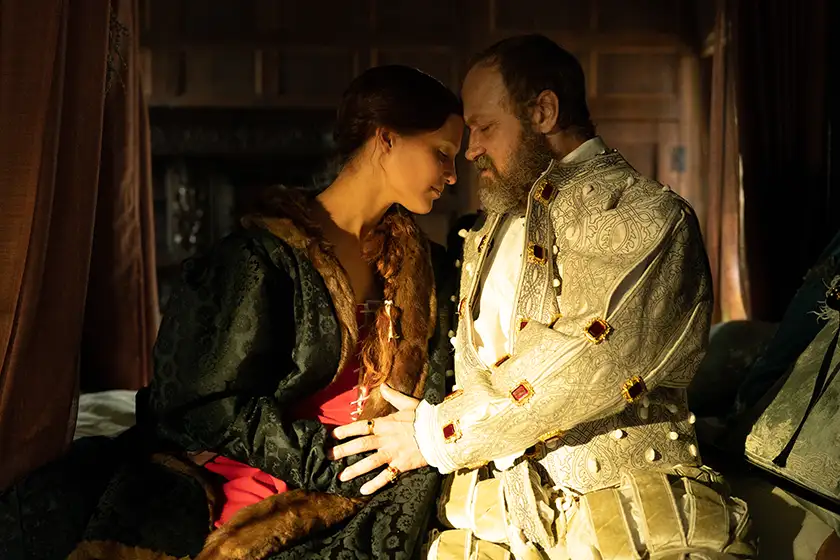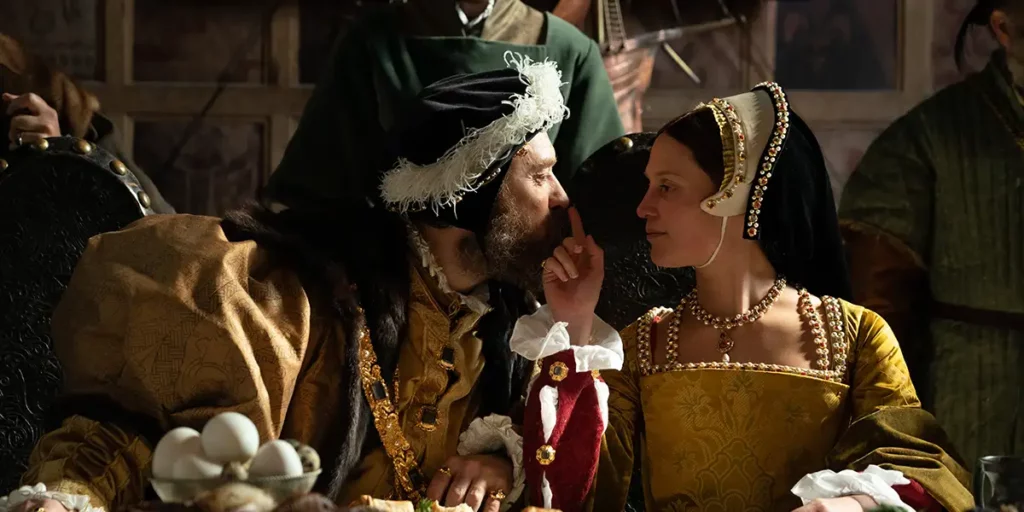In Firebrand, Karim Aïnouz recaps the marriage between Katherine Parr and King Henry VIII through a stale canvas that doesn’t do justice to her powerful story.
Director: Karim Aïnouz
Genre: Period Drama
Run Time: 120′
US Release: June 14, 2024
UK Release: TBA
Watch Firebrand: in US theaters
King Henry VIII had six wives whose stories were plagued by tragedy caused by the mad English monarch. He did all in his might to divorce two of them, even breaking the word of the lord in doing so. One of them died while giving birth to his only heir, and the rest of them were beheaded as the king brutally had his way.
However, the one wife who survived his madness, Catherine Parr, is the least talked about. Intrigued by this ignored story about her might and deliverance, Brazilian filmmaker Karim Aïnouz (Invisible Life, Motel Destino) tries to tell it to the world in his latest film, Firebrand. But he provides a stale and near-barren version of her powerful history.
Firebrand begins in 1543 and covers the last stages of the marriage between King Henry VIII (Jude Law, The Talented Mr. Ripley), who is suffering from a severe leg infection that is slowly killing him, and his sixth and final wife, Catherine Parr (Alicia Vikander, Ex Machina). “History tells us a few things, largely about men and war. For the rest of humanity, we must draw our own conclusions,” a quote reads before that introduction takes place. This hints at the appalling demeanor of King Henry VIII. He is a man tarnished by war and the ego of a selfish tyrant – his mind, body, and soul deteriorating by his own brutal decisions.
When her husband was away in France at war, Catherine Parr was a regent in his absence, and she made decisions that defied the king’s beliefs, proposing protestant morals and ethics. Unfortunately, Firebrand doesn’t show us many of the moments in which she does these acts in the kingdom. Since most aren’t familiar with Parr’s story, showing us how she defied a king who could have executed her at any second, with or without reason, would have provided the film with a more substantial, meaningful theme. Instead, we only get a quick glimpse of her secret endeavors at the beginning of the movie.

Catherine Parr met secretly with her childhood friend Anne Askew (Erin Doherty), a preacher for protestant beliefs and teachings against some of the king’s legislations. Both of them could get in deep trouble for these radical actions. In this defiant conduct, Catherine receives a powerful voice and fire that makes Firebrand come alive outside of the elegant look of its costumes and production. But that flame doesn’t last long enough to cover Aïnouz’s retelling.
When Henry VIII returns from the war and hears about Anne’s preachings and actions, he decides to take matters into his own hands, the only way he knows how: to execute those against him. But if Henry VIII has the power to rip away the power Catherine had acquired in his absence, he can’t cancel her actions, which have influenced some of the tyrant’s closest allies. As the king grows more paranoid and insecure about both his wife and the need for an heir, all while dealing with a gruesome leg injury that doesn’t seem curable, Catherine must now move very carefully.
With this premise, Karim Aïnouz adds a thriller element to the story; each player becomes more tense and worried due to the uncertainty of the king’s actions, all leading to barbarity. At first, you believe that Firebrand will focus on the activism of Catherine’s time as Henry VIII’s wife. Yet, the film later transitions to only covering the development of the king’s anger and ailment – almost as if it were switching main characters. The complexities of Catherine’s persona, both in her husband’s company and on her own, are not explored to a fulfilling point. It doesn’t do justice to her impact in this Tudor period.
The screenplay (Henrietta and Jessica Ashworth) lacks the gruesomeness that lurks in the shadows of Firebrand to delve into these complex historical figures and the times they lived in – this ferocity is hinted at with the shots of King Henry VIII’s puss-infested and scab-filled leg. Some lines of the film show how King Henry VIII is scared of Catherine’s mind and perceptiveness, examining the patriarchal society of the 1500s, when women were regarded as if their only purpose in life was to give birth. This is captured by some striking images shot by cinematographer Hélène Louvart (La Chimera, The Lost Daughter). Her lens captures the fragility and ferocity that Catherine keeps inside, and Vikander is a great model for these painting-like images. But this psychological dissection is left behind rapidly for other less exciting and engaging matters.
Another reason Firebrand doesn’t reach its potential is Jude Law’s performance. Law is menacing as King Henry VIII in the film’s first half. He wants to depict the king’s barbarity just by his way of speaking or physicality, and he’s covered in prosthetics that make him look unrecognizable. However, he hams it up way too much in the second half of the movie, to the point where it feels like a farce. Maybe that was what Aïnouz was aiming for; the Brazilian filmmaker occasionally places some scenes that mock the cruel royals of the times. But, considering the film’s melancholic, almost brooding tone, this side of his performance doesn’t fit at all and feels ridiculous.
Meanwhile, Alicia Vikander delivers a solid performance, using Catherine Parr’s balance between gentleness and fury as a guide. Her performance keeps the film captivating, even when the dialogue doesn’t do her any favors. The Swedish actress has played other royals before, as seen in A Royal Affair (and, to a certain degree, in The Green Knight). However, what separates her performances in these projects is how she can control the scenery with her poise in tone. In the case of Firebrand, Vikander can command the atmosphere; her facial expressions and glances determine the mood the film will have. Even when Jude Law tries to eat the scenery whole, Vikander governs how the film proceeds tonally.
Karim Aïnouz is a talented filmmaker with a keen eye for stories about women being encouraged to go against societal norms, like in his acclaimed picture Invisible Life (A Vida Invisivel). However, the pieces he wanted to place together for his latest work never fit together, leaving an incomplete, stale canvas without the psychological and emotional exploration needed to put Catherine Parr’s story on the big screen.
Firebrand will be released in US theaters on June 14, 2024.

